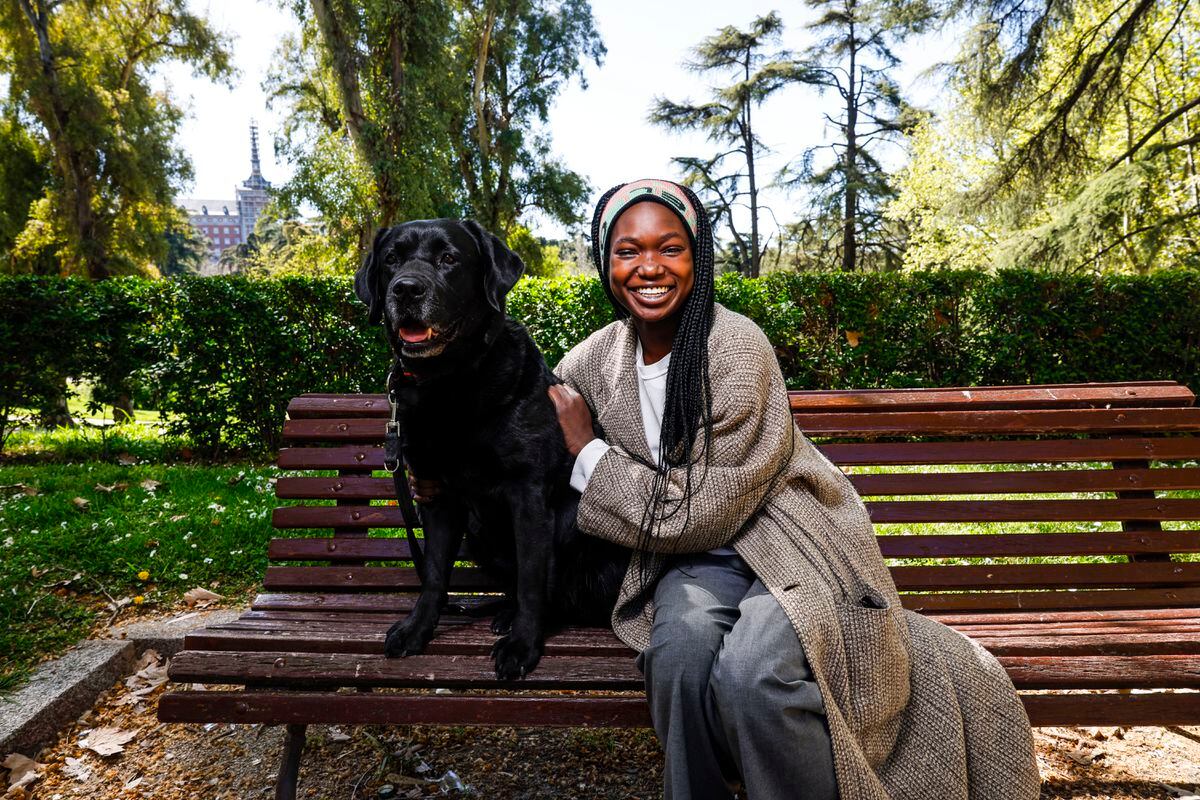The brand new gesture that the actress Edith Martínez-Val (Arrecife, Lanzarote, 22 years old) wears in the Parque del Oeste in Madrid with her dog, Married, shockingly clashes with the bloated and rigid face he shows in Benito Zambrano’s latest film, The jump, which opens this Friday, April 12, in theaters. In it she plays Aminata, a young woman of fierce bravery who rushes against the Melilla fence among hundreds of men after overcoming an infamous migratory journey. Martínez-Val says that her life in Spain was far from that reality and that getting closer to it has brought her endless personal discoveries; From there she delve into the stories of sub-Saharans who have overcome the journey to Europe until they look back on their African ancestors. “I was adopted and raised in a nuns’ school in Madrid, then I lived in France and Canada and I knew this from what I saw on the news.”
Ask. What have you learned?
Answer. Above all, I have learned to humanize the people we see in the news, to understand that everyone has a very strong and extreme reason for going through what they go through. For example, I find it heartbreaking when parents are separated from their children. While working on the film, you suddenly begin to hear stories, see faces, you gain an incredible affection for your character as you study him. And there you see the unfairness and anger of all this.
P. What would you like the public to take away from this film, which somehow puts soul into the news?
R. I hope it brings information and awareness. I hope that they come away considering the suffering that this problem, behind which are the policies of the two continents, means for all these people if this problem is not resolved. And also that they feel that they are people just like each of us.
P. ¿The jump Has it taken you to your roots?
R. Very much. I didn’t have them turned off, but I hadn’t had the chance to connect with people who told me stories that could be like those of my relatives. A part of me opened up there and that connection was very beautiful and interesting.
P. Has it brought you closer to other black people?
R. Yes, I had never had much contact with black people before. It has been my lifelong hairdressers, who are from different African countries, who have told me about their way of being, of working… Now I see a black woman and I see a base of great strength, like the character of Aminata .
P. This hairdressing moment is total.
R. I feel at home in the hair salon. Because it’s like six hours every time I go, so it’s like going to spend the afternoon with my aunts. They didn’t judge me, but for them it was important that I knew my roots if I wanted to. They told me: “If you are willing to know, I will teach you.” And I feel what they tell me as mine.
P. Because hair is a topic…
R. For me, Afro hair was torture, and having them touch it… I couldn’t make pigtails and have them move with the wind. Now it’s the opposite. Now Afro hair seems very cool to me, I wear it with great pride, just like my skin. Before, I didn’t really see it as something pretty, even though my parents told me it was beautiful.
P. How did you feel in your childhood?
R. I have been very lucky because I found a good group at school. I knew I was different and I naturalized it, but I have never suffered attacks or felt like I didn’t fit in. I know there are other people who have suffered atrocities.
P. She played a maid in the historical series Of the lives. What did he take from her?
R. It was a turning point in my career. It was my first daily job and it gave me foundation and confidence. Many times we have to reject projects because they offer us roles as prostitutes, or caricatures, or shoehorned in, bottomless roles. And it is angry and helpless that fiction does not address types of initiatives in which we can play, for example, a lawyer, which is what you already find in real life.
